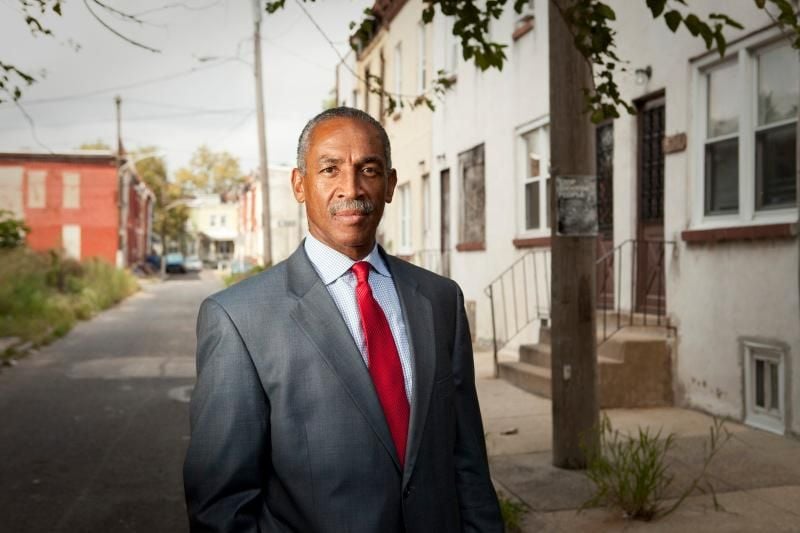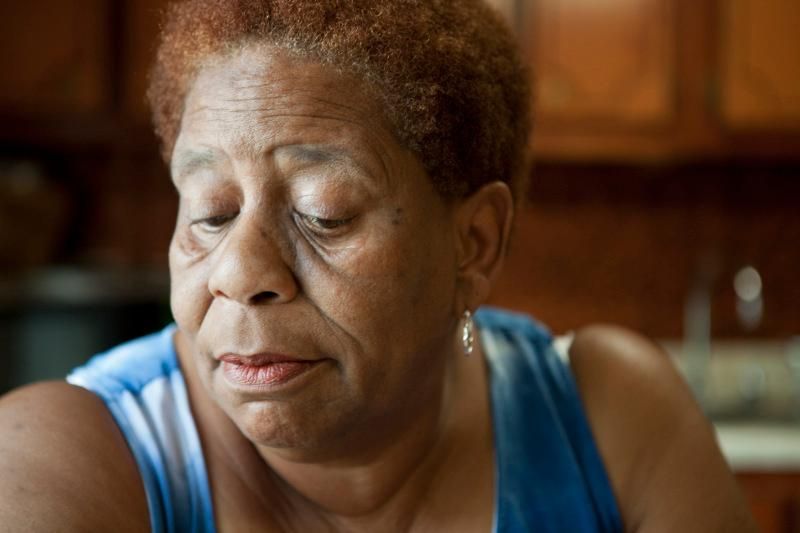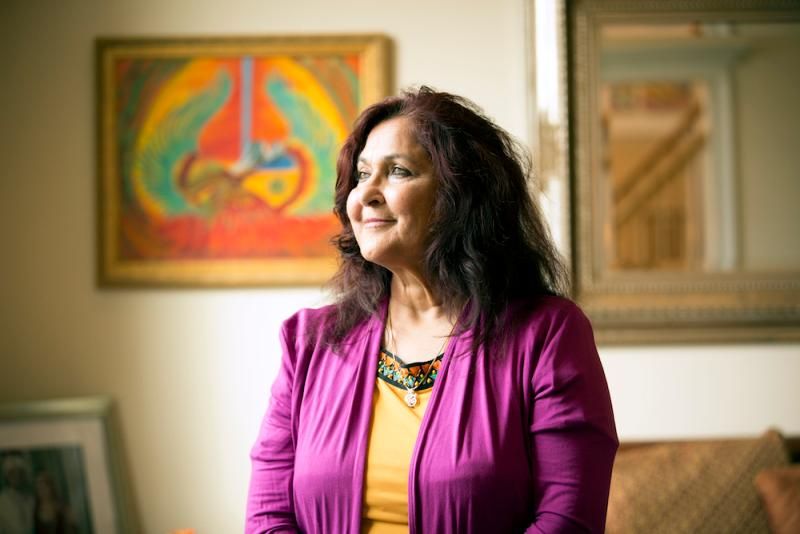A Photographer’s 40,000-Mile Journey to Find What Peace Means to Americans
John Noltner has driven across the country in an effort to document the many definitions of peace
/https://tf-cmsv2-smithsonianmag-media.s3.amazonaws.com/filer/95/e4/95e4637f-9f0a-47f1-8389-c4b62a0c1d96/peace_of_my_mind.jpg)
“What does peace mean to you?”
That’s the question photographer John Noltner has been asking across the United States for the past four years, driving to new towns and meeting up with strangers to get their story and take their picture for his latest book, A Peace of My Mind.
Noltner got the idea for the project in 2009 when the economy tanked and the assignment photographer suddenly found himself with a lot of time on his hands.
At first he drove through Minnesota asking folks the question. But though he self-published a book in 2011 with their responses, he found he wasn’t satisfied. The political climate of the day made him want to dig deeper and question people further away, so he went on the road again.
Since then, Noltner has logged some 40,000 miles in his car. It's easier to haul his lights, cameras stands and tripods that way, but driving also introduces a bit of whimsy to his trip. That way, if someone says to head north a few hours to follow a good source, he can. Often, his soundtrack on the road is a Lucy Kaplansky CD or Roman Mars’ 99% Invisible podcast. But he’s also happy just to sit in silence.
Erika Nelson, a grassroots artist out of Lucas, Kansas, whom he spoke to for this project, explains her work in a way that he can relate to: “[T]his intense relationship with people for short periods of time separated by long, lonely drives across the country.”
Driving gives him the time to think and make sense of all the different voices he comes across on his travels. Those conversations can get heavy, like his interview with a woman who made the walk from Selma to Montgomery with Martin Luther King Jr. in 1965 just days after Michael Brown was shot or interviewing a Pakistani immigrant dealing with the loss of her son, a firefighter, who was killed on 9/11.
Noltner speaks with Smithsonian.com about the evolution of his work, and what peace means to him.

How do you find people for this project?
I cast a wide net. I reached out to my friends and said, "I don't want to talk to you, but who do you recommend that I do talk to?" And that's how it started.
Do you really just ask the question, “What does peace mean to you?” Or do you sit down, get a coffee and shoot the breeze before you get into it?
I don't just spring it on them. We build our way up to it. Each of these stories is about an hour-long conversation. Very often it's at a person's home, where they work or some other place they're comfortable. I start by saying, tell me about yourself. If I didn't know anything about you, what would you want me to know? Then we slowly work our way toward the core questions: What does peace mean to you? How do you work toward it in your life? What are some of the obstacles you encounter along the way? Tell me a time when you saw a great example [of] peace in your life.
This line of questioning can easily fall into platitudes, I’d imagine. How do you keep it grounded?
Yes, this notion of peace it can get squishy and lofty pretty quick. We're talking about high ideals. When you ask someone to come up with an example in their life of when it works, that really makes it tangible. That really brings it down to the ground.
Do you take photos before or after your interview?
I always do the photograph after the interview. If I walk in the door and say, ‘Hey my name's John, let's take your picture,’ that's a little jarring for me and for them. So after we've sat down and talked for an hour, they know me a little better and I know them a little better so the photo is more comfortable. I do take clues from what we're talking about. I think about the story as we're talking and I let that inform what I want to do for the photograph. I'm just a slow thinker sometimes, so it takes me a little time to think about what our options are and where we want to go and what the light's doing today.
Very often, the photo is simple. It presents itself, at least to me. And sometimes we have to struggle a little bit more. I interviewed a man named Tyrone Werts in Philadelphia, Pennsylvania. He had spent 36 years of a life sentence in prison for second-degree murder. His sentence had been commuted about a year before we talked. I met him at Temple University in this dumpy little office where he works. Now he works with at-risk youth to help prevent them from making some of the same mistakes that he did. We got to the end of the interview and I said, "Tyrone, I don't think we can make a good picture here. It's not a very interesting setting. We've got to think about it."
He came to the interview wearing a coat and tie. I said, "It seems to me like it would be a really good visual contrast to photograph your new reformed self out in front of the house where the murder had happened." At first when I said that, he didn't say anything. I thought, oh dear, maybe that's not what you're supposed to ask a guy who just got out of prison. But eventually, he said, "You know what? That would mean a lot to me to go back to that place." So we did.
I think those choices about setting are important. Sometimes, setting matters less than just the person. Then we'll come in tight on the person. But where the environment makes sense and the weather cooperates, we try and take advantage of those things.

Have you ever felt like you understood someone better after photographing them?
I don't know if I've ever thought about it that way. The two are so closely linked in my own mind. But there are certainly times when I walk away from the photo feeling very satisfied. We have found a way to capture that person—gotten to the essence of who they are.
How do you deal with viewpoints that are different than your own?
There are people that I've interviewed in this project that see the world very differently than I do. I find that challenging for myself, but in fact that's part of the process for this project. I think we all have to be uncomfortable from time to time. We all have to be willing to grapple with those difficult emotions that come up when we disagree with somebody. And sometimes, when you face those, you realize that you've got to reconsider your own position.
Can you give me an example?
I began this project as a freelance photographer. When the economy took a nosedive in 2008, 2009, I like to say that the economy handed me some free time. My assignment schedule got much lighter. We had to make some difficult economic choices. We chose to sell my big beautiful truck to buy a beat-up 10-year-old Honda Civic with 140,000 miles on it to relieve some economic pressure, so I could take time to do this project.
At the time, gas prices were going through the roof; every quarter oil companies were setting record profits. I couldn't even keep gas in my truck, so we sold it. I had a chance to interview an oil company executive. I promise you, going into that conversation, I had a certain perception of what an oil company executive was going to be and it was not positive. But when I sat down with Mark Williams, when I was willing to hear him out and hear his story, I began to recognize a humanity that I really was unwilling to admit to before. That's one from the first book.
Do you have an example from your latest book?
Two different people from different parts of my life suggested I interview a woman named Joanne Bland. Well, I googled her, I found her phone number, and I called her up. I said, ‘What are the odds you have five hours free tomorrow?’ And she was gracious and kind enough to say sure, come on over.
Joanne Bland marched with Martin Luther King Jr. from Selma to Montgomery when she was 11 years old. I sat with her in her living room and interviewed her 12 days after Michael Brown was shot in Ferguson, Missouri. It was a really raw emotional conversation. I felt honored that this person, who had experienced the Civil Rights Movement in such a rich and personal way, would welcome in this stranger, this Midwestern, middle-aged white guy, and have a really honest and open conversation for no reason other than I was willing to listen.
That's the really powerful thing about the project. If you sit down with people, even if you have no real connection, if you express an honest desire to listen and an honest desire to understand as opposed to judge or correct or convince somebody, if you're just there to listen, people open up.

Who else from your travels that has especially stayed with you?
I’m going to talk about Talat Hamdani, I mention her because we just passed the 15th anniversary of 9/11 happening. And I met Talat in Long Island. She's a Pakistani immigrant and her son, Salman, died on 9/11. He was an NYPD cadet and when the towers were hit, he went back to the towers to help people evacuate. However, his body wasn't found for quite some time. Because of his Muslim heritage and the politics of the day and what was going on in the country, for quite awhile there was some suspicion around Salman. They were wondering whether he had been involved with the plot because of his Muslim heritage.
So here's this mother, who had not only lost her son on that day, but also found that his character was being attacked because of his faith; she had that added burden to deal with. Eventually they found his body. He had an EMT bag beside him in one of the stairwells. He was heading up to try to help people. That really sticks with me.

Who else has left an impression?
When we talk about peace, I'm amazed how often people find peace out of difficult situations. We often believe that we could be peaceful or we could find peace if everything was going our way, but I'm continually amazed how people are able to incorporate peaceful responses in really difficult situations. Bud Welch lost his only daughter when Timothy McVeigh blew up the Federal Building in Oklahoma City in 1995. Bud Welch fell apart, as you might expect. This was his only child.
Bud became an alcoholic; he lost his businesses; he really wanted nothing more than for Timothy McVeigh to be wiped off the face of the earth. Then he saw a news clip of McVeigh's father on TV. He looked at it and thought, that guy is as wrecked as I am. His world changed on the same day my world changed. He reached out to Timothy McVeigh's father eventually. He went over to their house. They're sitting in the kitchen table, all the family pictures are looking down on them, including Timothy McVeigh.
When he got to know Bill, he realized that he didn't want Timothy McVeigh to die. He started working against the execution of Timothy McVeigh. He didn't succeed. McVeigh was executed pretty quickly, but now Bud Welch goes around the world working against public punishment having figured out he got no peace, he got no sense of relief, from the loss of one more life. Those moments of grace and forgiveness and transformation and the belief that some other way is possible stick with me.
What made you decide to take this project from a state level to a national one?
Really, my increasing frustration with our national dialogue. The way so many things ask us to look at what separates us. I saw an opportunity to use my photography and my storytelling to sort of explore what we have in common. I just felt like I wasn't done. Now I’m talking with an organization that seems like it's going to fund an international version of this project.
I'm still not done. [Next,] I really want to do a series of stories of people near the end of their life, A Peace of My Mind: Final Wisdom or Parting Words, something like that because I think there's a special kind of wisdom that we acquire when we're faced with our own mortality. We've had a lot of loss in our family, and I think that collection of stories could be a really great resource for others going through the same thing.
Do you think a certain understanding of loss drives you to find these stories and answers?
Yeah, I think certainly it does. But honestly, I can't say it's in search of the answers because I don't know that we're going to get the answers. It’s in search of the conversation. Whatever it is, we do we do it communally, it's all a part of relationship. I think that really that's what the project boils down to—how to use conversation to build relationships and relationships can bridge divides and bridging divides can lead to peace.
Whose shoulders do you stand on as you do this work?
Well, if I were going to claim the loftiest title that I could, I would love to consider myself Studs Terkel with a camera. He was an oral historian who worked for Chicago Public Radio and he did a number of books. If you're adding to your reading list there's a book called Hard Times, which is about the Great Depression. Studs would go out and interview people from all different backgrounds.
We get a certain understanding of history from facts and statistics and dates and things like that. We get an entirely different understanding of history from oral stories, from people's stories. So Studs would go out and interview someone who was a milkman, someone who was a business leader, someone who was a prostitute, someone who was a baseball star during the Great Depression and ask how that experience affected their lives. He would edit these into these wonderful books and wonderful collection of stories, which give us this really rich human understanding of a particular time in our history. If I could say I was standing on anyone's shoulders, I would sure like it to be his.
Did you ever get a chance to meet him before he died?
I called him in college, when I was a fledgling journalist about a project I was about to undertake. At the time I think I probably looked him up in the phone book in the school library. I was so startled when he answered his own phone, that there he was at the other end speaking to me, that I don't even remember what I said. I'm certain that I bungled the conversation and wasted the opportunity, but he was so gracious and kind and encouraging. I guess the best advice that I remember from him was him saying, ‘Look, you don't have to have it all figured out in order to start this. Just start and the rest of it will sort itself out.’
That is what remains in my head as I've developed this project. I always describe it as walking down a foggy path where you can see a couple of steps ahead but no further. But, if you take those couple of steps then a couple more are revealed to you. So this has been the journey of this project.
Has anyone asked you your famous question?
I don't answer that.
You don't answer it?
No, I'm kidding. I do answer it. But like many of the people in the book, depending on the day and on recent experience, that answer can shift. I don't believe that we will ever live in a world without conflict. I think conflict will always exist. The question in my mind is, what do we do when we encounter it.?There's always something we can do to make it better. There's always something we can do to make it worse. When I think of peace, [it's] built around the question of what's next. We've got some big challenges in life, but how do we meet them? How do we confront them? Is there something we can do to make it better?
How has your answer evolved since you began this journey in 2009?
When I started the project, my focus was around political issues. Certainly not every interview was based on that, but my own perspective was really rooted in political issues. As I've gone on, especially given our situation today, I don't see our solution in political solutions. I see our solutions in individual responsibility and people making a conscious choice to make a positive difference in the world. If anything, this collection of stories is a collection of examples of what is being done that's good. If we only focus on problems without addressing solutions, we leave ourselves shortchanged. I think this collection of work is a collection of solutions that we can look at and sort of emulate and use to expand toward a better future.